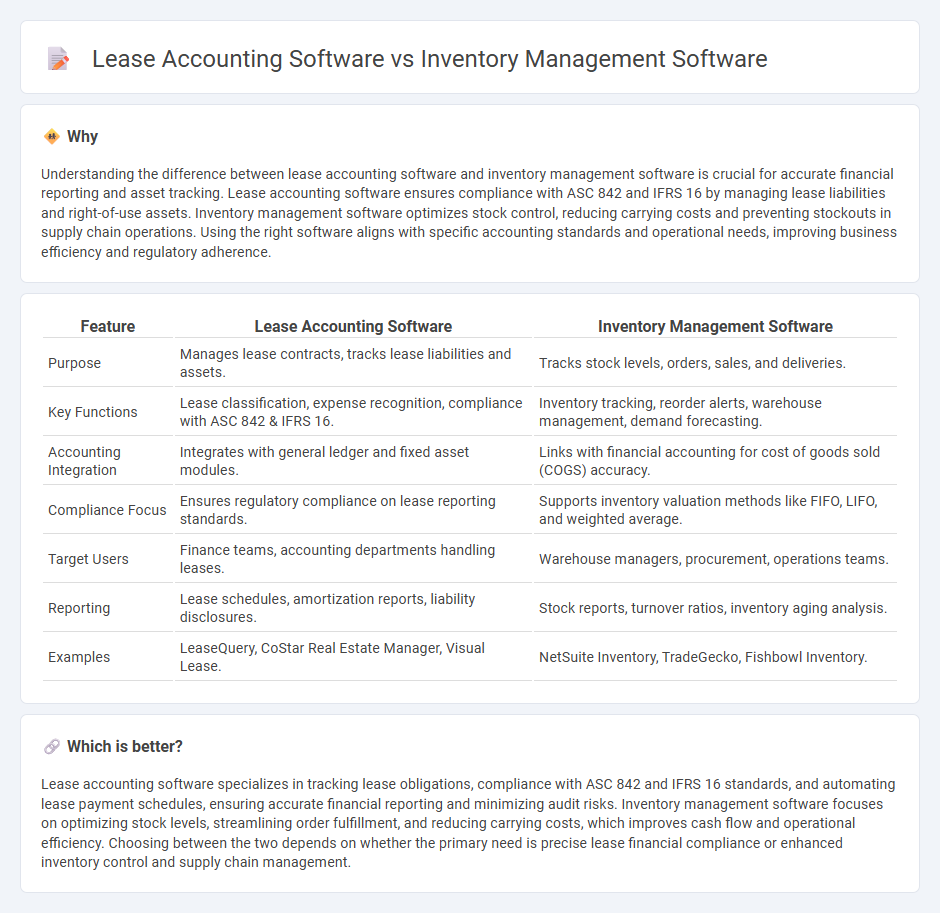
Lease accounting software streamlines the tracking and management of lease agreements, ensuring compliance with financial reporting standards such as ASC 842 and IFRS 16. Inventory management software focuses on optimizing stock control, order processing, and supply chain efficiency to reduce costs and prevent stockouts. Discover how each software type can transform your financial and operational workflows by exploring their key features and benefits.
Why it is important
Understanding the difference between lease accounting software and inventory management software is crucial for accurate financial reporting and asset tracking. Lease accounting software ensures compliance with ASC 842 and IFRS 16 by managing lease liabilities and right-of-use assets. Inventory management software optimizes stock control, reducing carrying costs and preventing stockouts in supply chain operations. Using the right software aligns with specific accounting standards and operational needs, improving business efficiency and regulatory adherence.
Comparison Table
| Feature | Lease Accounting Software | Inventory Management Software |
|---|---|---|
| Purpose | Manages lease contracts, tracks lease liabilities and assets. | Tracks stock levels, orders, sales, and deliveries. |
| Key Functions | Lease classification, expense recognition, compliance with ASC 842 & IFRS 16. | Inventory tracking, reorder alerts, warehouse management, demand forecasting. |
| Accounting Integration | Integrates with general ledger and fixed asset modules. | Links with financial accounting for cost of goods sold (COGS) accuracy. |
| Compliance Focus | Ensures regulatory compliance on lease reporting standards. | Supports inventory valuation methods like FIFO, LIFO, and weighted average. |
| Target Users | Finance teams, accounting departments handling leases. | Warehouse managers, procurement, operations teams. |
| Reporting | Lease schedules, amortization reports, liability disclosures. | Stock reports, turnover ratios, inventory aging analysis. |
| Examples | LeaseQuery, CoStar Real Estate Manager, Visual Lease. | NetSuite Inventory, TradeGecko, Fishbowl Inventory. |
Which is better?
Lease accounting software specializes in tracking lease obligations, compliance with ASC 842 and IFRS 16 standards, and automating lease payment schedules, ensuring accurate financial reporting and minimizing audit risks. Inventory management software focuses on optimizing stock levels, streamlining order fulfillment, and reducing carrying costs, which improves cash flow and operational efficiency. Choosing between the two depends on whether the primary need is precise lease financial compliance or enhanced inventory control and supply chain management.
Connection
Lease accounting software integrates with inventory management software to streamline asset tracking and financial reporting, ensuring accurate capitalization and depreciation of leased equipment. This connection enables real-time synchronization of lease obligations with inventory levels, enhancing compliance with accounting standards such as IFRS 16 and ASC 842. Automated data exchange reduces manual errors, optimizes lease portfolio visibility, and supports comprehensive financial analysis across both leasing and inventory management functions.
Key Terms
Stock Tracking
Inventory management software excels in real-time stock tracking, offering detailed insights into product quantities, locations, and movement to optimize supply chain efficiency. Lease accounting software primarily focuses on financial management of asset leases, lacking comprehensive stock tracking capabilities necessary for inventory control. Explore in-depth how each system can transform your operational management by understanding their distinct functionalities.
Asset Depreciation
Inventory management software primarily tracks and optimizes stock levels, focusing on real-time inventory valuation but often lacks detailed asset depreciation capabilities crucial for long-term financial reporting. Lease accounting software specializes in managing leased assets, offering robust features for calculating and reporting asset depreciation according to standards like ASC 842 and IFRS 16, ensuring compliance and accurate financial statements. Explore the key differences to choose the best solution for your asset management and depreciation needs.
Lease Liability
Inventory management software primarily tracks stock levels, orders, and sales but lacks the capabilities to handle complex lease liabilities outlined in accounting standards like ASC 842 and IFRS 16. Lease accounting software specializes in managing lease liability calculations, recognizing right-of-use assets, and generating lease-related financial reports critical for compliance and audit purposes. Explore detailed comparisons to understand which solution best addresses your lease liability management needs.
Source and External Links
Zoho Inventory - Free software for managing inventory, sales, purchases, and warehouses across multiple channels and devices, with automation and centralized tracking.
inFlow - Easy-to-use inventory management solution for small to midsize businesses, supporting stock control, order tracking, sales, shipping, barcoding, and integration with scanners and label printers.
Inventory Management System (Microsoft AppSource) - Cloud-based, user-friendly software for businesses of all sizes, offering real-time sales tracking, stock control, insightful reporting, and integration with Microsoft 365 and Teams for improved operational efficiency.
 dowidth.com
dowidth.com